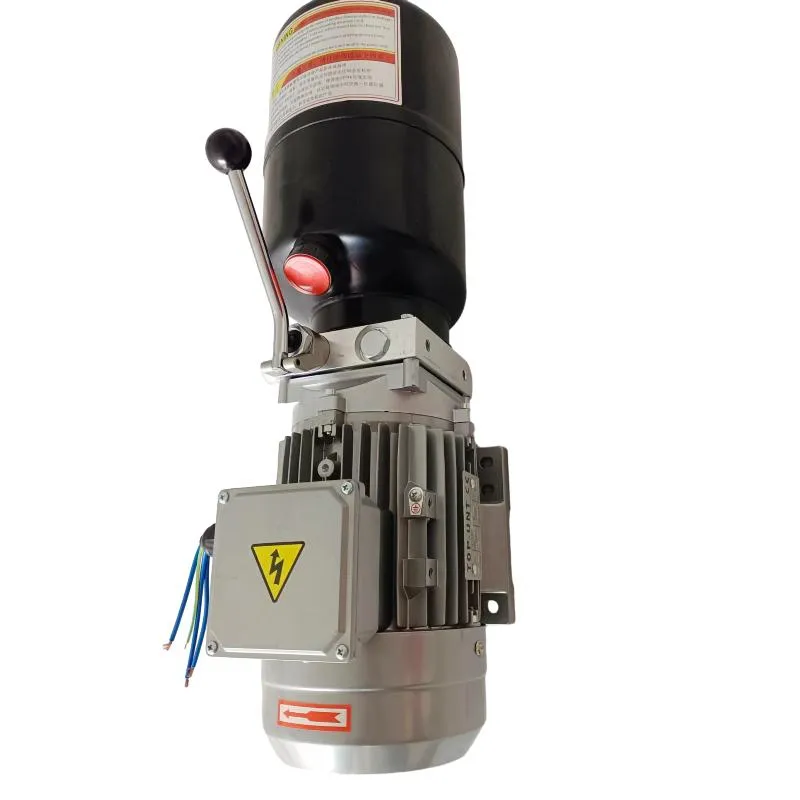Aug . 18, 2024 16:14 Back to list
Hydraulic Cylinder Manufacturers for Hand Pump Applications and Solutions
The Role of Hand Pump Hydraulic Cylinders in Modern Industries
Hand pump hydraulic cylinders are vital components in various industrial applications, offering a combination of reliability and efficiency in lifting, pushing, and pressing materials. These hydraulic devices are often used in construction, manufacturing, and auto repair industries, demonstrating the versatility and effectiveness of hydraulic technology. In this article, we will explore the importance of hand pump hydraulic cylinders, the mechanisms behind their operation, and the factors to consider when choosing a suitable factory for production.
Understanding Hydraulic Cylinders
At their core, hydraulic cylinders operate on the principle of Pascal's Law, which states that pressure applied to a confined fluid is transmitted undiminished throughout that fluid. Hand pump hydraulic cylinders use this principle to generate force and motion. The block of the hydraulic cylinder houses a piston that moves in response to the pressure created by the operator using the hand pump. As the pump is activated, hydraulic fluid is forced into the cylinder, pushing the piston outward and generating lifting force.
Applications of Hand Pump Hydraulic Cylinders
One of the main attractions of hand pump hydraulic cylinders is their broad range of applications. In construction, they are often used to lift heavy beams, formwork, and equipment. In manufacturing, these cylinders are crucial for tasks that require precision pressing, such as metal forming and assembly. For automotive industries, they are indispensable for lifting vehicles to facilitate repairs and maintenance.
The portability of hand pump hydraulic cylinders makes them especially appealing for fieldwork where heavy machinery might not be accessible
. Their compact size and manual operation mean that they do not require external power sources, making them an economical choice for many operations.Choosing the Right Factory
hand pump hydraulic cylinder factories

When it comes to selecting a factory for hand pump hydraulic cylinders, several factors should be taken into account
1. Quality of Materials The durability of a hydraulic cylinder directly correlates with the quality of materials used in its construction. A reputable factory will utilize high-grade steel and trusted hydraulic fluids to ensure the longevity and reliability of their products.
2. Manufacturing Standards Look for factories that adhere to international safety and quality standards, such as ISO certifications. Such standards ensure that the products are tested for performance, safety, and reliability.
3. Customization Options Different industries have unique requirements, and a factory that offers customization can significantly enhance operational efficiency. Evaluate whether the factory can tailor the hydraulic cylinders to specific sizes, pressure ratings, and features that suit the intended application.
4. After-Sales Support The relationship with the manufacturer shouldn’t end with the purchase. Consider factories that offer comprehensive after-sales support, including maintenance services and access to spare parts, to ensure long-term operational efficiency.
5. Reputation and Experience A factory with a proven track record and favorable reviews in the industry is often a safer choice. Engaging with manufacturers who have extensive experience can lead to better designs and superior products.
Conclusion
Hand pump hydraulic cylinders are indispensable tools in various sectors, providing a manual yet effective solution for lifting and pressing needs. Understanding the workings of these hydraulic devices, alongside critical factors for factory selection, can significantly enhance operational capabilities in your respective field. As industries continue to evolve, investing in quality hydraulic solutions will ensure that businesses remain competitive and productive.
-
1.5 Ton Flipping Oil Cylinder 70/82-40-217-720-Hebei Shenghan Hydraulic Machinery|Precision Hydraulic Cylinder,Custom Hydraulic Solutions
NewsAug.29,2025
-
1.5 Ton Flipping Oil Cylinder 70/82-40-217-720 | Hebei Shenghan Hydraulic Machinery Co., Ltd.
NewsAug.29,2025
-
High-Precision [90/105-50-180-480] Industrial Component | Durable & Reliable
NewsAug.27,2025
-
High-Performance Set of 50/60-45-290 471 | Durable & Reliable Components
NewsAug.26,2025
-
Efficient Pallet Truck Power Units - Reliable Hydraulic Systems
NewsAug.25,2025
-
Premium Set of 50/60-45-290 471 Parts | High Performance
NewsAug.24,2025
